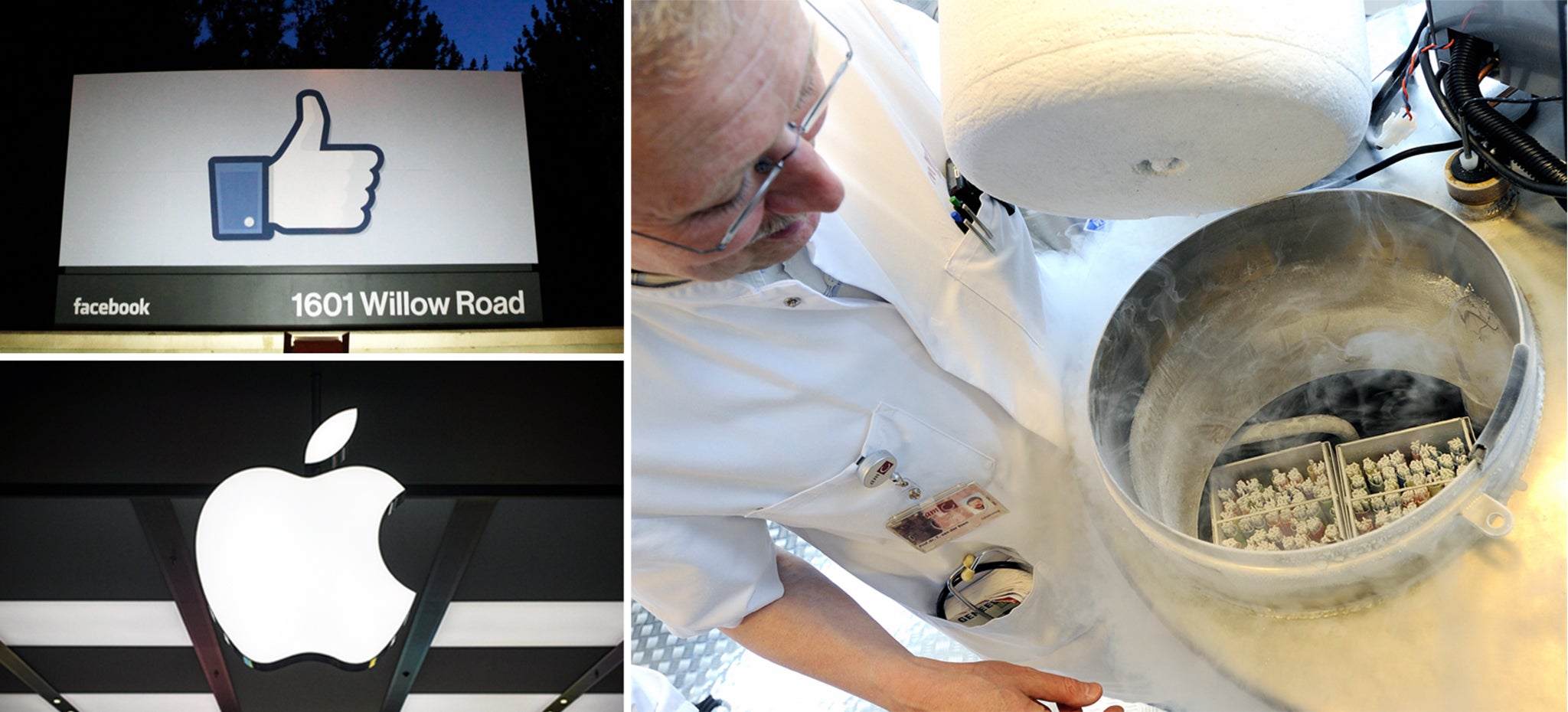Facebook and Apple offering to pay for female employees to freeze their eggs is utterly misguided
This is far from a benefit indicative of a forward-thinking, female-friendly business model

What are they key things you look for in a new employment package? A generous holiday allowance? Flexible working hours? Egg-freezing? If the last one is a deal breaker, you should seriously consider applying for a job with Facebook or Apple.
The Silicon Valley giants renowned for having their fingers on the technological pulse will ride the wave of new developments in the field of assisted reproductive technologies – by paying for their female employees to freeze their eggs. Facebook already pays for the procedure, and last night it was announced that from January, Apple will also foot the $20,000 bill.
The justification for this ‘perk of the job’ seems clear. Put your eggs on ice, and you can become the one of the best in the business. That’s how it’s done. If you put a stopwatch on your fertility, you can reach the top of your game – because you won’t have to take time out for the nuisance that is trying to have children alongside a career.
This message, and its connotations, are worrying – not least when they are sent by bosses to their employees. Far from being a benefit indicative of a forward-thinking, female-friendly business model, offering to fund egg-freezing to women in a corporate setting seems to make several assumptions – both about their current thoughts, and their future plans. It seems to tell women that they cannot juggle their professional and personal lives, and gives the impression that the company thinks you should put your personal life on hold so you can dedicate yourself entirely to the job. It could be viewed as an easy way around offering more flexible working-hours for parents, and a means by which the development of a supportive, family-friendly work environment is able to be sidestepped.
More than this, by offering the egg freezing funding, these businesses reinforce the age-old idea that reproductive decision-making – and family planning – is the responsibility of women alone. Although sperm quality also declines as men get older, there are no comparable company perks for businessmen. Rather than focussing on developing family-oriented policies, with funding for time out for both men and women who want to have children, this latest ‘perk’ rests upon rather lazy thinking about gender and its stereotypes. This is not to say that having children and a high-flying career is easy. But the solution to this should be a rethinking and reworking of the way we structure our professional lives, and not the financing of a fertility procedure.
In making the woman-equals-mother mantra part of company policy, it is possible that the female employees of Facebook and Apple may feel under pressure – real or imagined – to take advantage of this ‘benefit’, rather than have their family at a ‘professionally inconvenient’ time. What’s more, it seems that these companies run the risk of alienating their female employees who do not want to mother. These latest egg freezing policies offered by employers rest upon a dangerous assumption that all women working for Facebook and Apple want to become mothers, and that they want to do so in a specific way – that is to say, by mothering at a particular age, when their career has reached a particular stage. And like so many other cultural forces, offering to pay for egg freezing in this way is also highly insensitive to those women who experience infertility and therefore cannot reproduce at all.
It is also vital to note that freezing your eggs does not guarantee that you will be able to have a family. Not only are there very few women who have successfully used this reproductive technique, but knowledge of the medical efficacy of egg freezing – when used for ‘social’ reasons – is limited. In fact, most recently, the American Society for Reproductive Medicine issued a report in which it was stated that too little is yet known about the emotional, financial, medical, ethical, and psychological effects of egg freezing for so-called ‘social’ reasons for the Society to recommend its use. Given that frozen eggs are likely to be used by women at a later stage of reproductive health, the message that putting your fertility on ice will lead to parenthood in the future may be fostering false hope.
Unsurprisingly, information technology is one thing – reproductive technology quite another. My advice, Facebook and Apple? Stick to what you know

Join our commenting forum
Join thought-provoking conversations, follow other Independent readers and see their replies